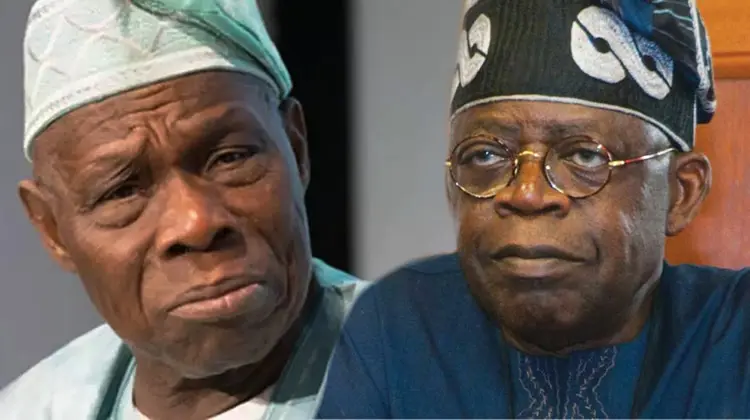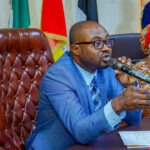Former President Olusegun Obasanjo has criticised the Lagos-Calabar Coastal Highway, calling it a wasteful and corrupt venture. The project, estimated to cost N15.6tn, has been a subject of controversy, with many questioning its transparency and financial implications.
Obasanjo made these remarks in his new book, Nigeria: Past and Future, where he detailed the leadership failures in the country. He accused the Bola Tinubu administration of mismanaging public funds, particularly in awarding contracts without competitive bidding.
Join our WhatsApp ChannelThe 700km road, which will cost N4.93bn per kilometre, is being built by Gilbert Chagoury’s Hitech Construction Company. Chagoury, a long-time associate of Tinubu, has been at the centre of contract award controversies. Many critics, including former Vice President Atiku Abubakar, have questioned why the contract did not follow a transparent bidding process.
READ ALSO: Lagos Assembly Crisis: Meranda Steps Down As Obasa Returns
Obasanjo Calls Tinubu’s Government Corrupt
Obasanjo did not hold back in his criticism, stating that corruption remains a major problem in Nigeria’s leadership. He accused the Tinubu administration of prioritising personal gains over national development.
“The Lagos-Calabar Coastal Highway is an example of waste, corruption, and misplaced priorities. The President has ignored protests and pressed on with this unnecessary project,” Obasanjo wrote.
He argued that most Nigerian leaders, including governors and ministers, are ill-prepared for leadership. Instead of serving the people, he claimed they focus on enriching themselves and their allies.
New Vice President’s Residence a Waste of Resources – Obasanjo
Beyond the Lagos-Calabar project, Obasanjo also criticised the government’s decision to spend N21bn on a new residence for Vice President Kashim Shettima. He described it as an attempt to embezzle public funds while the country faces economic hardship.
“Building a N21bn house for the Vice President in these difficult times is nothing but wasteful spending. It is a way to divert public funds,” he stated.
Many Nigerians have also expressed concerns over this expenditure, questioning why such an amount is needed when there are more pressing economic issues.
Tinubu’s Administration Accused of Short-Changing Nigerians
According to Obasanjo, Tinubu’s government operates with a “transactional” mindset, where public resources are treated as personal wealth. He believes that the administration is continuing the culture of self-enrichment at the expense of the people.
“Everything is said to be transactional, and the slogan is ‘It is my turn to chop,’” he said, referring to the popular phrase associated with Tinubu’s campaign.
These remarks have sparked fresh debates about governance and accountability in Nigeria. Many are questioning whether public funds are being spent on projects that genuinely benefit the people or whether they serve political and personal interests.
Presidency Declines to Respond to Obasanjo’s Criticism
When asked about Obasanjo’s remarks, Tinubu’s media aide, Bayo Onanuga, declined to comment. This silence has only fueled further speculation and criticism from opposition figures and analysts.
Observers note that Obasanjo’s criticisms, though often controversial, have historically raised important national conversations. His past warnings about governance issues have sometimes proven accurate, leading many to take his words seriously.
Obasanjo Warns Against Leadership Without Accountability
The former President highlighted a disturbing trend where Nigerian politicians misuse public funds without consequences. He cited examples of state governors who enter office with massive debts but later emerge as billionaires within a few years.
“How do you explain a governor who owed banks billions before assuming office and, within two years, has cleared all debts without running any business? The money clearly came from the state’s resources,” he stated.
He further noted that many governors secure huge loans, believing they can repay them from state funds. This, he argued, is a form of systemic corruption that has trapped Nigeria in a cycle of underdevelopment.
Call for Afrodemocracy as an Alternative to Western Democracy
Beyond criticising government projects, Obasanjo suggested a new governance model tailored for Africa. He called it “Afrodemocracy,” a system that considers African history, culture, and values instead of blindly following Western liberal democracy.
“If even Western nations admit that their democracy has flaws, why should we continue with a system that is clearly not working for us?” he asked.
According to him, Afrodemocracy would address leadership failures by creating a governance system that aligns with African realities rather than copying foreign models that do not fit.
Obasanjo’s Criticism Sparks National Debate
Obasanjo’s remarks have once again placed him at the centre of Nigeria’s political discourse. While some believe his criticisms are valid, others argue that he is part of the system that created these problems.
Regardless of differing opinions, his stance has intensified scrutiny on Tinubu’s government, particularly on the Lagos-Calabar Highway project and other financial decisions.
As Nigerians continue to debate the country’s governance challenges, one thing remains clear: accountability and transparency must improve if the nation hopes to move forward.
Emmanuel Ochayi is a journalist. He is a graduate of the University of Lagos, School of first choice and the nations pride. Emmanuel is keen on exploring writing angles in different areas, including Business, climate change, politics, Education, and others.
- Emmanuel Ochayihttps://www.primebusiness.africa/author/ochayi/
- Emmanuel Ochayihttps://www.primebusiness.africa/author/ochayi/
- Emmanuel Ochayihttps://www.primebusiness.africa/author/ochayi/
- Emmanuel Ochayihttps://www.primebusiness.africa/author/ochayi/

















Follow Us